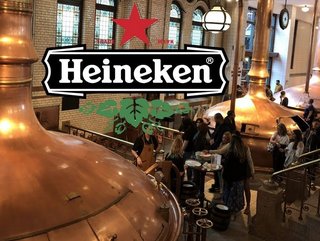'Ninja' approach key to Heineken supply chain transformation

Digital transformation projects have an astonishingly high fail rate of around 70%, according to McKinsey, and so any transformation success story has much to teach the wider world of industry and commerce.
One such success story is Heineken Europe, which recently completed the transformation of its supply chain across the region.
Heading up that colossal project was Thibaut Boidin, Chief Transformation Officer for Heineken in France.
Europe is a massive region for Heineken, where it has 25 operating companies. Boidon reveals that in transforming its European supply chain it targeted four areas:
- Simplifying the complexity of its product and packaging
- Leveraging its network of operating companies
- Improving and harmonising its way of working
- Designing low-carbon footprint operations
Speaking to Boston Consulting Group, Boidon goes on to reveal the company did not have to wait long to begin seeing the benefits of this approach.
“It's quite amazing,” he says, “because even in the first year of our transformation we already had some significant results.”
Transformation helped Heineken halve bottle use
This included a 52% reduction in the volume of unique bottles used by the company, and also cut by 50% the amount of secondary packaging it used.
Perhaps most significantly, the company went from having 25 supply and operations planning teams to just one.
On sustainability, meanwhile, it has cut carbon emissions in production by 24% compared to 2018 levels.
Boidon led Heineken’s Transformation Management Office (TMO), and says the TMO was vital for the success of this transformation.
“It was absolutely critical because while you drive a transformation you have also, at the same time, got to drive your day-to-day business,” he says.
He adds: “So if you don't have a ‘ninja’ that helps you drive the transformation while the rest of the organisation is focusing on the day-to-day business, it's quite a challenge to run it.
People 'critical to any transformation' says Heineken
“The human and people element to change management is critical for the success of any transformation. People are at the core of our transformation because we cannot run a transformation without really focusing on our people.”
This echoes what industry experts believe – that most digital transformation projects fail because organisations treat transformation as a tech project rather than a people project.
To this end, Boidon says Heineken decided to shape its change-management transformation around three components.
“The first is leadership, because everything starts with us as leaders,” he explains. “How we run the transformation, and how we are able to engage the organisation around what has to be done.”
He adds: “The second element is around capabilities – the competencies of our people. Here it's about filling the gap between where they are today and where they need to be tomorrow.
“And then there is communication, because in such a big transformation happening across different operating companies you have to make sure you have something that is tailored to the local reality."
He says this means it’s vital to not only find the right way to communicate messages but also to listen to feedback, “to make sure you're always aligned with people”.
In terms of the challenges of change management, Boidon says everything came down to “heads, hearts and hands”.
He added: “When you have to deal with big transformations you have to address the questions in people’s heads. Why are you doing this transformation? What is your case for change?
“You also have to reach the hearts of people, and make sure they are engaged in the transformation.
“And you have to appeal to their hands, because people want to understand concretely what is in it for them, and how they can contribute on a day-to-day basis to the transformation."
Supply transformation needs a 'can-do' mindset
Summarising Heineken’s transformation success story, Boidon says: “There were three key elements. The first was enthusiasm, and can-do mindsets. This is super important for any transformation.
“The second element is discipline and structure – about making sure you have the right drumbeat, and that your team and the organisation is working in a disciplined way.
"And then you need humility. You have to listen to feedback from the organisation, and adapt your governance align with people’s needs."
On the subject of governance, Boidon reveals the main feedback from the organisation was a concern the transformation would be overly process-driven and bureaucratic.
“That was a bit hard to hear,” he admits, “but at the same time it was quality feedback, so we decided, with a bit of humility, to adapt our governance and to make it more aligned with what was needed.”
The end result of the transformation, he says “is a future-proof and sustainable supply chain”.
Boidon adds: “The second legacy is to build this transformation capability within Heineken. We are still training this muscle.”






